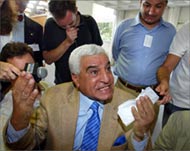Artefact smugglers get life sentences
A Cairo court has sentenced three men, including a former senior civil servant, to life imprisonment for taking part in a scam that smuggled thousands of antiquities out of Egypt.

Judge Gamal Eddin Safwat acquitted three of the 10 defendants at the end of one of the country’s biggest antiquity trials.
“Smuggling antiquities abroad is one of the most dangerous crimes because of the negative impact it has on the country’s economic interests,” the judge said before announcing the verdict in a Cairo courthouse.
Life sentences
Foremost among the convicted was Abdel Karim Abu Shanab, the former director of a Supreme Council of Antiquities’ department that inspects the collections of registered antiquities traders.
Prosecutors have charged him with taking bribes, forgery and profiteering from his position by supplying smugglers with certificates that said genuine antiquities were fakes. Under Egyptian law, only fake antiquities can be exported.
 |
|
Hawass said the verdict would |
The court also ordered Abu Shanab be removed from his position.
According to court documents, Abu Shanab was sentenced to life imprisonment for stealing records from the council and helping smuggle antiquities.
He received a sentence of 15 years for other charges but will serve both sentences concurrently, staying in prison for 25 years. A life sentence in Egypt equals 25 years.
‘This is injustice’
Other defendants also received multiple sentences, in one instance adding up to 55 years, but will only stay in prison for the duration of the longest sentence.
|
“This is all because of personal problems between myself and the antiquities bureau of investigations to remove me from my position” Abdel Karim Abu Shanab, |
“This is injustice. I have done nothing,” Abu Shanab said after the verdict, tears rolling down his cheeks as he stood leaning against the side of the dock. His lawyer Ali Sebaq said they would appeal.
Before the sentence, Abu Shanab told reporters the charges against him were fabricated. “This is all because of personal problems between myself and the antiquities bureau of investigations to remove me from my position,” he said.
“There is no crime. No one took bribes or stole.”
Not guilty
The six other convicted defendants received sentences ranging from life imprisonment to 15 years in prison as well as fines. A Swiss citizen received 15 years’ imprisonment, one of four defendants convicted in absentia.
 |
|
Relatives of the smugglers hid |
Another of those tried in absentia is an Egyptian who holds German citizenship, according to the documents.
Former antiquities official Salah Eddin Ramadan gasped with relief when he heard he was among three defendants found not guilty.
“I cannot pull myself together,” he said, shaking in the caged dock. “Thank God. I know I’m innocent.”
Important step
Zahi Hawass, the council’s secretary general, praised the verdict.
“This is an important step toward protecting Egypt’s
antiquities from being looted by gangs,” he said.
|
“Smuggling antiquities abroad is one of the most dangerous crimes because of the negative impact it has on the country’s economic interests” |
Happiness mixed with sadness in the courtroom when the sentence was read.
One woman standing next to the dock erupted in tears of joy as she cried: “Praise be to God.” Another slapped her face in grief as she sobbed inconsolably.
Some hugged and others surged toward the dock to exchange words with the defendants. One defendant angrily banged on the dock with his fist.
Massive scam
The accused were part of a group that officials believe has stolen about 57,000 artifacts from state warehouses and smuggled thousands of them abroad.
During the investigation, police found thousands of coins, statues and sarcophaguses in tunnels under the villas of three relatives – businessmen who were convicted in an earlier trial. The cache allegedly included certificates signed by Abu Shanab.
Egypt has stepped up efforts in recent years to stop trafficking of antiquities and to get countries to return them.
It has warned foreign museums that it will not help them mount exhibitions on the Pharaonic era unless they return smuggled artifacts.